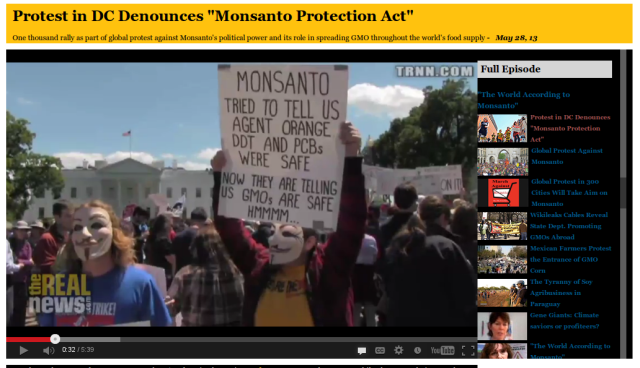I don’t normally support protesters, especially the “occupy” type, but on May 25, 2013 there was a protest worth taking note of, and even protesting.
This was the global “March Against Monsanto”. Our local CTV anchor said they were “Protesting Monsanto, a company who is helping increase food production”!!!
To feed the hungry? Does Monsanto give away their seeds? Monsanto is one of the most litigious companies in world history! They have even prosecuted farmers for growing genetically modified crops without even knowing it! The pollen blew across the road from one field to the next and Monsanto had the nerve to prosecute the farmer for growing crops that had got away from them.
They should have sued Monsanto for allowing their polluted pollen to cross the road!
This is an issue where copyright really has no jurisdiction. It is impossible to prevent crops from being contaminated by Monsanto’s genetically modified pollen!
This really isn’t about intellectual property. It is not really about eating contaminated food, though that is part of it. This is about controlling the world’s food supply!
From ancient times, farmers have always saved their seeds from one year to the next, but now this is becoming impossible! You have to get permission from Monsanto to do this, and then you must pay them a royalty! They did not create the food portion of the crop. It was God who did that!
In fact they did not even create the “roundup-ready” portion of the genome. They found it growing in weeds, and managed to transfer it to food crops such as soybeans and corn. I’d say that it is God who holds the copyright to food crops, and even to the “roundup-ready” genome!
In my opinion, Monsanto is a criminal organization. They are attempting to take control of the world’s food supply. Why? If they can control what you eat, you will become their serf!
It is unethical for one company, or even a group of companies to take control of the world’s food supply. If our governments are allowing them to do this, then this is proof that those governments are not working for the well being of their own people!
This is one issue that has caught our family’s attention lately. There have been reports of farm animals dying from eating Monsanto’s polluted corn, and we became concerned.
My son contacted Kelloggs to see if one of the boxes of cereal we had contained genetically modified corn. Their answer was that “Kelloggs uses genetically modified corn, but we can’t tell you if the particular Kellogs brand of cereal you have has Genetically Modified corn or not”. If that is the case then we as a family are not comfortable buying any Kelloggs products any more.
While there are some radical pagans who also are against Monsanto, this is not about earth worship. This is about feeding my family food that has not been tampered with. It is about safe food, and about the God-given rights for people to keep seeds from year to year, and grow their own food.
Do you remember the controversies of the 1960s, 1970s, and 1980s over Agent Orange, DDT, and PCBs? Apparently these were all Monsanto products!
Evidently Monsanto has not changed. This is a company that has a long history of unsafe products being used without regard for people, animals, and even food crops!
Don’t trust your government. Not only do they selectively enforce the laws they have, they are producing laws that protect large multinational companies like Monsanto from responsibility for the damage they cause to our food supply.
As a Christian, should I be concerned with this issue?
That’s a good question. Didn’t God give parents the responsibility to protect their children? Don’t fathers have a responsibility to feed their families? Is it OK for fathers to feed garbage to their children… or poison? If you feed your children genetically modified foods, you are potentially feeding them poison, in my opinion!
Do you trust a company like Monsanto to do all the necessary testing on the products they sell? Given their history of flogging flawed products like Agent Orange, DDT, and PCBs, this is unlikely. What is more likely is that YOU are the guinea pig that Monsanto is using to test its products!
Twenty years from now when you develop cancer, how long will it take for them to discover that it was caused by the roundup-ready gene? How many human guinea pigs will have to die before the evidence points to these products?
What can you do?
For starters, call the numbers on the packaging of the food products you have in your home, and ask them if there is any genetically modified food crops in your product. You have a right to know. If they won’t give you a straight answer, don’t buy those products again. Make sure they know that you are concerned.
Check out the NON GMO project’s website and patronize the brands that they certify, but don’t be afraid to contact those companies to double-check. At least then they will know that their efforts are appreciated, and it will keep them honest.
Look for the NON GMO label. If it is not on the product you are looking at, it probably is contaminated, although not every food crop has been modified just yet. The two big ones are corn and soybeans, but I believe canola has also been contaminated. I believe I heard the other day that there is a GM wheat about to be unleashed on us.
Here is a list from the nonGMOProject website of plant species that are known to be contaminated;
- Alfalfa (first planting 2011)
- Canola (approx. 90% of U.S. crop)
- Corn (approx. 88% of U.S. crop in 2011)
- Cotton (approx. 90% of U.S. crop in 2011)
- Papaya (most of Hawaiian crop; approximately 988 acres)
- Soy (approx. 94% of U.S. crop in 2011)
- Sugar Beets (approx. 95% of U.S. crop in 2010)
- Zucchini and Yellow Summer Squash (approx. 25,000 acres)
ALSO high-risk: animal products (milk, meat, eggs, honey, etc.) because of contamination in feed.
Common Ingredients Derived from GMO Risk Crops
Amino Acids, Aspartame, Ascorbic Acid, Sodium Ascorbate, Vitamin C, Citric Acid, Sodium Citrate, Ethanol, Flavorings (“natural” and “artificial”), High-Fructose Corn Syrup, Hydrolyzed Vegetable Protein, Lactic Acid, Maltodextrins, Molasses, Monosodium Glutamate, Sucrose, Textured Vegetable Protein (TVP), Xanthan Gum, Vitamins, Yeast Products.
You may also be wondering about…
- Tomatoes: In 1994, genetically modified Flavr Savr tomatoes became the first commercially produced GMOs. They were brought out of production just a few years later, in 1997, due to problems with flavor and ability to hold up in shipping. There are no genetically engineered tomatoes in commercial production, and tomatoes are considered “low-risk” by the Non-GMO Project Standard.
- Potatoes: Genetically modified NewLeaf potatoes were introduced by Monsanto in 1996. Due to consumer rejection by several fast-food chains and chip makers, the product was never successful and was discontinued in the spring of 2001. There are no genetically engineered potatoes in commercial production, and potatoes are considered “low-risk” by the Non-GMO Project Standard.
- Wheat: There is not currently, nor has there ever been, any genetically engineered wheat on the market. Of all “low-risk” crops, this is the one most commonly (and incorrectly) assumed to be GMO. It is a key commodity crop, and the biotech industry is pushing hard to bring GMO varieties to market. The Non-GMO Project closely watches all development on this front.
- Salmon: A company called AquaBounty is currently petitioning the FDA to approve its genetically engineered variety of salmon, which has met with fierce consumer resistance. Find out more here.
- Pigs: A genetically engineered variety of pig, called Enviropig was developed by scientists at the University of Guelph, with research starting in 1995 and government approval sought beginning in 2009. In 2012 the University announced an end to the Enviropig program, and the pigs themselves were euthanized in June 2012. (http://www.nongmoproject.org/learn-more/what-is-gmo/)
This is really scary, folks. This is not something that we should ignore, unless you don’t mind dieing early. Just because the people developing these products are highly educated, it does not mean that they know what they are doing. They are excited about the technology, and the possibilities for personal wealth that it might bring them. Money is a huge incentive for many, and blinds them to the ethical grey areas. Scientists are no exception.
Also check out;
http://therealnews.com/t2/index.php?option=com_content&task=view&id=31&Itemid=74&jumival=10237
http://bc.ctvnews.ca/vancouver-joins-global-day-of-protest-against-monsanto-gmos-1.1297106
http://www.euronews.com/2013/05/26/day-of-worldwide-protests-in-march-against-monsanto/






